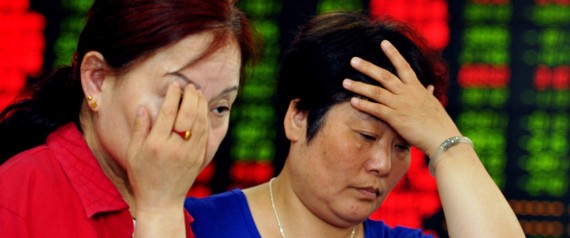 NEW YORK — After a sizzling rally that more than doubled the value of China's main stock market over the past year, investors are now heading for the exit.
NEW YORK — After a sizzling rally that more than doubled the value of China's main stock market over the past year, investors are now heading for the exit.China's Shanghai Composite plunged more than 7 per cent Friday, one of its biggest drops in the last 10 years. The index is down 19 per cent since its recent high reached June 12.
Chinese investors may be scrambling, but investors in the U.S., Europe and elsewhere shouldn't be overly worried. Here's what has happened and why investors shouldn't react rashly:
HOW DID THE BUBBLE BEGIN?
There have been signs of overheating in China for a while. Shares in Shanghai more than doubled over the past year, despite evidence the Chinese economy is slowing. Chinese economic growth fell to 7 per cent from January through March, the slowest quarter since 2009. At the same time, state-owned media has encouraged ordinary Chinese for months to load up on shares. Many borrowed heavily to buy stocks, taking out so-called margin loans.
Rising stocks encouraged companies to raise money by issuing shares and to use the proceeds to pay down debt. In the first half of the year, the Shanghai stock market led the world in initial public offerings: 78 companies issued shares in Shanghai, raising $16.6 billion, according to a study by the accounting firm EY. Hong Kong was No. 2 with 31 deals that raised $16 billion. Shenzhen was No. 5 with 112 deals that raised $7 billion.
Now analysts say the flood of new shares is overwhelming the market and helping to push prices down. Moreover, the government began to worry the market had reached dangerous levels, and Chinese regulators have started to tighten rules on margin lending.
ISN'T CHINA THE SECOND-LARGEST ECONOMY ON EARTH? SHOULD I BE WORRIED?
China's economy is huge, but the country's stock market is largely isolated. Outside investors have only been able to access the Chinese stock market since October, and that required purchasing stock in Hong Kong. To buy directly in the Chinese stock market required a specialized license.
The lack of access has made it difficult for investors, including U.S. fund managers, to get exposure to the Chinese stock market.
For example MSCI, a company which publishes stock indexes, made a decision earlier this month not to include Chinese ``A'' shares, or stocks traded on the mainland, in its global indexes. MSCI largely cited the lack of access for foreign investors to China's market as the reason to continue to keep China out of its indexes.
There are funds that have exposure to Chinese stocks, and they have not fared well.
U.S.-based exchange-traded funds, the iShares FTSE/Xinhua China 25 index and the iShares MSCI China Index Fund, lost 2 per cent. A fund that owns A-shares, which used to be restricted to the domestic market, fared worse: The Deutsche X-Trackers Harvest CSI 300 China A-Shares plunged 8 per cent.
HOW MUCH MONEY HAS BEEN PULLED OUT?
Even though U.S. investors have limited exposure to China's market, there is still money there. Institutional investors have pulled $22 billion out of Chinese stock funds this year, with $7 billion of that withdrawn just this month, according to EPFR Global.
"Institutional investors have been taking money off the table most of this year and part of last year,'' said Cameron Brandt, director of research at EPFR Global, which tracks fund flows around the world. ``My sense is that they've been expecting something ugly from this retail frenzy that has been driving Chinese markets.''
IS THERE A POINT WHERE I SHOULD GET WORRIED?
The Chinese stock market is down 19 per cent since hitting a peak two weeks ago. If it goes below 20 per cent, it would be entering what's known as a bear market. Going into a bear market is not necessarily a sign of worry, but it could be a sign that more swings are likely to come before things get better.
The biggest concern is whether the drop in China's stock market will cause the country's economy to slow. Many U.S. and European companies do business in China, and a weaker Chinese economy could result in lower sales and profits for them.
Original Article
Source: huffingtonpost.ca/
Author: Ken Sweet
No comments:
Post a Comment